Showing the Pathway to Bliss
Shlok of the Week 18 – Shrimad Bhagavat – 10.5.1-2
Nandotsav – Bliss Incarnate
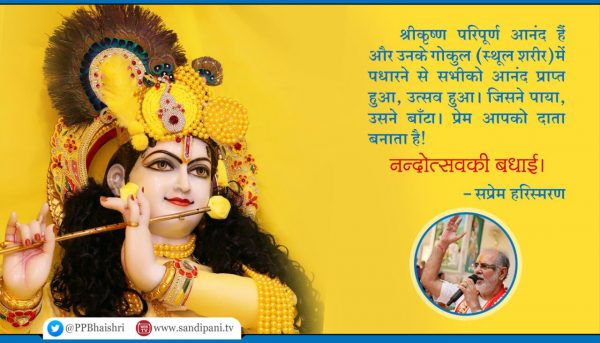
ŚriKṛṣṇa is Bliss-incarnate. His arrival in Gokula (the gross, physical body) results in a
festival wherein everyone attains bliss. Whoever received, shared. Love makes you a giver.
Felicitations for the celebrations of Nandotsava!
#Saprem_Harismaran | @PPBhaishri
The Jubilant Celebrations of Nandotsav
The Lord is Bliss Incarnate
śrīśuka uvāca
nandastvātmaja utpanne jātāhlādo mahāmanāḥ ।
āhūya viprān vedajñān snātaḥ śuciralaṅkṛtaḥ ॥ 10.5.1
vācayitvā svastyayanaṃ jātakarmātmajasya vai ।
kārayāmāsa vidhivat pitṛdevārcanaṃ tathā ॥ 10.5.2
Śrīmad Bhāgavata Mahāpurāṇa 10.5.1-2
श्रीशुक उवाच
नन्दस्त्वात्मज उत्पन्ने जाताह्लादो महामना: ।
आहूय विप्रान् वेदज्ञान्स्नात: शुचिरलङ्कृत: ॥ १०.५.१
वाचयित्वा स्वस्त्ययनं जातकर्मात्मजस्य वै ।
कारयामास विधिवत् पितृदेवार्चनं तथा ॥ १०.५.२
श्रीमद् भागवत महापुराण १०.५.१-२
Who are Nand Baba & Yashoda?
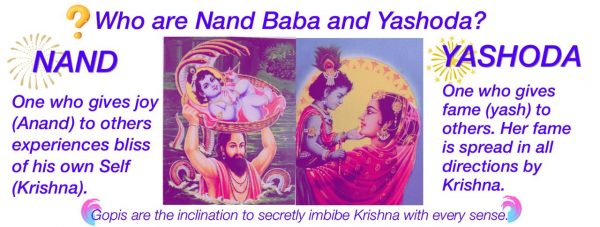
jātayor nau mahādeve
bhuvi viśveśvare harau
bhaktiḥ syāt paramā loke
yayāñjo durgatiṁ taret
Śrimad Bhāgavatam 10.8.49
Rājā Parīkṣit is astounded to hear of the great good fortune of Nanda Bābā & Mā Yaśodā relishing the divine pastimes of the Supreme Lord as a young baby in Braja and wonders what they possibly did in a past life to achieve this? Śukadevaji Mahārāja replies that they were previously the great ‘Vasu’ (a celestial class of beings) called Droṇa & his wife Dharā. They were obedient to the service of their Lord Brahma and received a boon of devotion for the Lord from Him. Droṇa appeared in Vṛndāvana as Nanda Mahārāja and Dharā as Mother Yaśodā who raised Śrī Krṣṇā, who is the supreme Ātmā of all – as their very own son. The supreme truth inherent in this is that the Lord is attained through his grace alone (kṛpā sādhya) and can not be obtained or earned through any other effort or means (puruṣārtha).
Nanda Mahārāja is the foremost cowherd of Braja and a magnanimous personality. The mark of one who has directly realised the bliss-incarnate Lord as his own ātmaja (son, born of his own Self) is that his heart is so purified and boundless that he shares joy and bliss with all! This is why the jubilant celebrations of Kṛṣṇa birth are called “Nandotsava”.
Mother Yaśodā is also called ‘Nandagehinī’ or the true home (abode) of Nanda. One who grants the Lord Himself to others, who gives the glory of merit (Yaśa) to others receives the greatest honor of all – of being the Lord’s own beloved mother. She fulfilled her role of loving her son and caring that he receives the right saṃskāras (values and ceremonies) for him to imbibe meritorious qualities which distinguish his personality. She also gave glory to all the residents of Braja in loving, serving and raising Śrī Krṣṇā as their very own. This is her supreme glory.
Mā Yaśodā is the supreme embodiment of maternal affection towards Śrī Kṛṣṇa. Her love is fully reciprocated – Mother Yaśodā is the giver of fame yet Śrī Kṛṣṇa spreads that fame of Mā Yaṣodā, and the boundless Lord agrees to be bound by the cord of love by the hand Mā Yaśodā.
śrī-śuka uvāca
ekadā gṛha-dāsīṣu
yaśodā nanda-gehinī
karmāntara-niyuktāsu
nirmamantha svayaṁ dadhi
yāni yānīha gītāni
tad-bāla-caritāni ca
dadhi-nirmanthane kāle
smarantī tāny agāyata
Śrimad Bhāgavatam 10.9.1-2
What does Gokul signify?
Gokula is the physical gross body (sthūla śarīra), made up of the organs of knowledge and action which interact directly in the sense objects of this world. It is the seat of physical experiences and expressions.
This is the second of three primary city of Śrī Kṛṣṇa’s pastimes, where he performs innumerable pastimes in eleven years whilst honoring three vows – to not cut his hair, to wear no shoes and to wield no weapons.
Śrī Kṛṣṇa protected all the residents of Gokula from demonic attacks of nescience (avidyā), hypocrisy (bakāsura) and others and despite directly revealing His opulence (in the form of the universe in his mouth to Mother Yaśodā, for example), their loving affection for Him as their own son (vātsalya bhāva) triumphed!
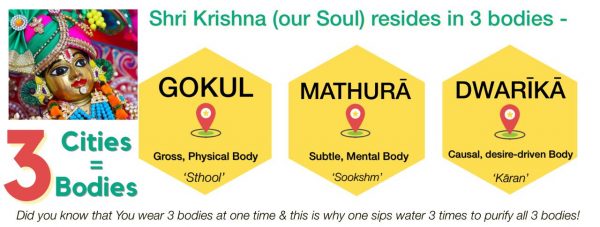
16 Sanskaar
From Vikaar to Sanskaar
Saṃskāras are Vedic rituals for purification which enable the ever-pure soul in an embodied form (jīva) to realise its true identity (Śiva). There are sixteen such ceremonies which span the lifespan of a living being right from conception to cremation – these are a vital pillar of Vedic Sanātana Dharma.
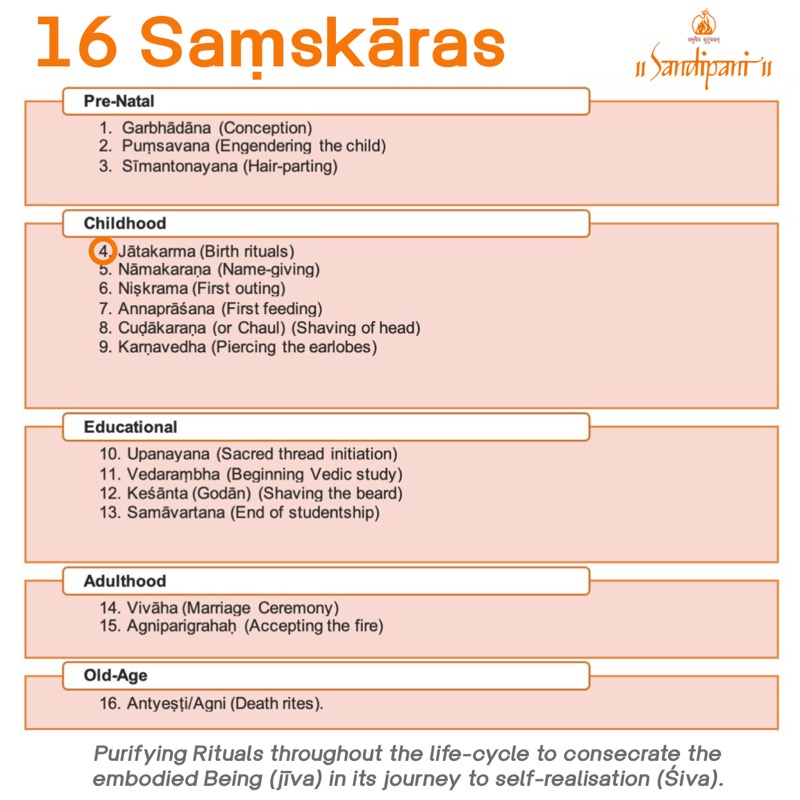
The fourth of these sixteen ceremonies is called the “Jātakarma Saṃskāra”. These newborn birth rituals are performed in full accord of śruti and sṃṛti scriptures, as outlined in the eighteen verses of Nandotsava with great faith and jubilation by both Nanda Mahārāja and Mā Yaśodā in Gokula.
Even after attaining the supreme success of human birth (the Lord) as their own son, they remain committed to the principles of Vedic Sanātana Dharma and fully worship the Brāhmaṇas as the embodiment of the Vedas they have learned. Thus, their conduct of purity, worship, charity, salutations, all-inclusive celebrations are a pathway for all to supreme success.
Saṃskāras are vital to remove distortions (vikāras). As such, one may wonder why the eternally perfect Lord required any Saṃskāras to be performed, He is fully complete?
Nanda Mahārāja does this for the benefit of all, inspiring with his own conduct the importance of following the Ṛṣi Paramparā of 16 Saṃskāra, to lead a life of bliss!
Nanda Mahārāja upholds Dharma for the benefit for all, in keeping with the principle expounded in the Bhagavad Gītā that when a great man performs such exemplary actions are they are followed by the people at large, leading to the benefit and
upliftment of all.
yad yad ācarati śreṣṭhas
tat tad evetaro janaḥ
sa yat pramāṇaṃ kurute
lokas tad anuvartate
Śrīmad Bhagavad Gītā 3.21
Purifying the Mind through Charity
Purity (śuddhi) is key to peace (śānti). As per Manusṃṛti, the most vital form of purity is in the purity of the food that one eats (source of income that provided sustenance). All objects are not purified in the same way – just as the body is cleaned by bathing so too is wealth purified by charity.
The Bhagavad Gītā explains in great detail the importance of partaking only after first offering a portion of one’s earnings in a spirit of Yagya. To grant charity with the right understanding of time, place, recipient, and purpose is certainly auspicious.
Certain period of times are especially fortuitous – such as the all-auspicious akṣaya-tṛtīyā tithi or at the unique moment after a baby is born but before his umbilical cord is cut (called ‘prajā tīrtha). The merit accrued from Charity given at these junctures remain imperishable!
Nanda Mahārāja celebrates the birth of baby Krṣṇa by donating the most excellent gifts (cows, silken garments, sesame seeds, gems, silver and more), to ensure his child’s well-being. Śukadevaji Mahārāja calls Nanda Bābā ‘mahāmanā’ because his mind is fully purified and only a purified mind is truly magnanimous! This is reflected in the open-handed and open-hearted spirit of giving to all during Nandotsava.
śrī-śuka uvāca
nandas tv ātmaja utpanne
jātāhlādo mahā-manāḥ
āhūya viprān veda-jñān
snātaḥ śucir alaṅkṛtaḥ
Śrīmad Bhāgavatam 10.5.1
Swastivachan – Blessings from the Lord’s own Mouth
The mouth of the universal form of the Lord is depicted as the Brāhmaṇas (or knowledge class of society). Thus, the blessings of those who have imbibed the mantras and teachings of the Vedas in a Guru Paramparā are certainly bound to bear fruit (be true), as the Vedas are not man-made but divine in origin and the embodiment of Truth.
Nanda Bābā understands and honours this by inviting ‘veda-jñāna’ Brāhmaṇa to bless his baby and officiate the Vedic ceremonies.
brāhmaṇo sya mukhamāsīdbāhū rājanyaḥ kṛtaḥ ।
ūrū tadasya yadvaiśyaḥ padbhyāṃ śūdro ajāyata ॥
From his mouth came forth the Intellectuals (brāhmaṇas), from his arms the Warriors
(kṣatriyas), from his thighs the Merchants (vaiśyas) and from his feet the Workforce
(śūdras)
Śukla Yajur Veda 31.11
Following both Shruti and Smriti Literature
Nanda Bābā honoured both Śruti and Sṃṛti scriptures under the guidance of suitably qualified veda-jñāna Brāhmaṇas. Worship of deities as per śruti injunctions and worship of the manes (offerings to ancestors) are performed in Sanātana Dharma at the time of the birth of a newborn.
One who is not an atheist is called ‘āstika’ and this does not indicate belief in “God”, but rather indicated faith in the Vedas and living by their teachings. Nanda Bābā and the villagers of Gokula were fully committed to Vedic principles and fulfilled their duties in accordance with their Varṇāśrama Dharma. Lord Krṣṇa grew up in such a divine environment as a cowherd.
To learn more about these foundational principles of what makes one ‘truly hindu’
Register-Your-Interest for a course in the Foundations of Sanatana Study by Sandipani
Sādhanā:
https://bit.ly/REGISTER-HERE–NOW
Shri Krishna – Bliss Incarnate
Śrī Kṛṣṇa is the trinity of Sat (Existence), Cid (Knowledge), Ānanda (Bliss), because he Creates, Maintains, and Destroys without a sense of attachment, expectation, or grief. We offer obeisances to this Lord, who removes the trifold afflictions which cause suffering.
saccidānaṅdarūpāya viśvotpatyādi hetave
tāpatrayavināśāya śrīkṛṣṇāya vayam numaḥ
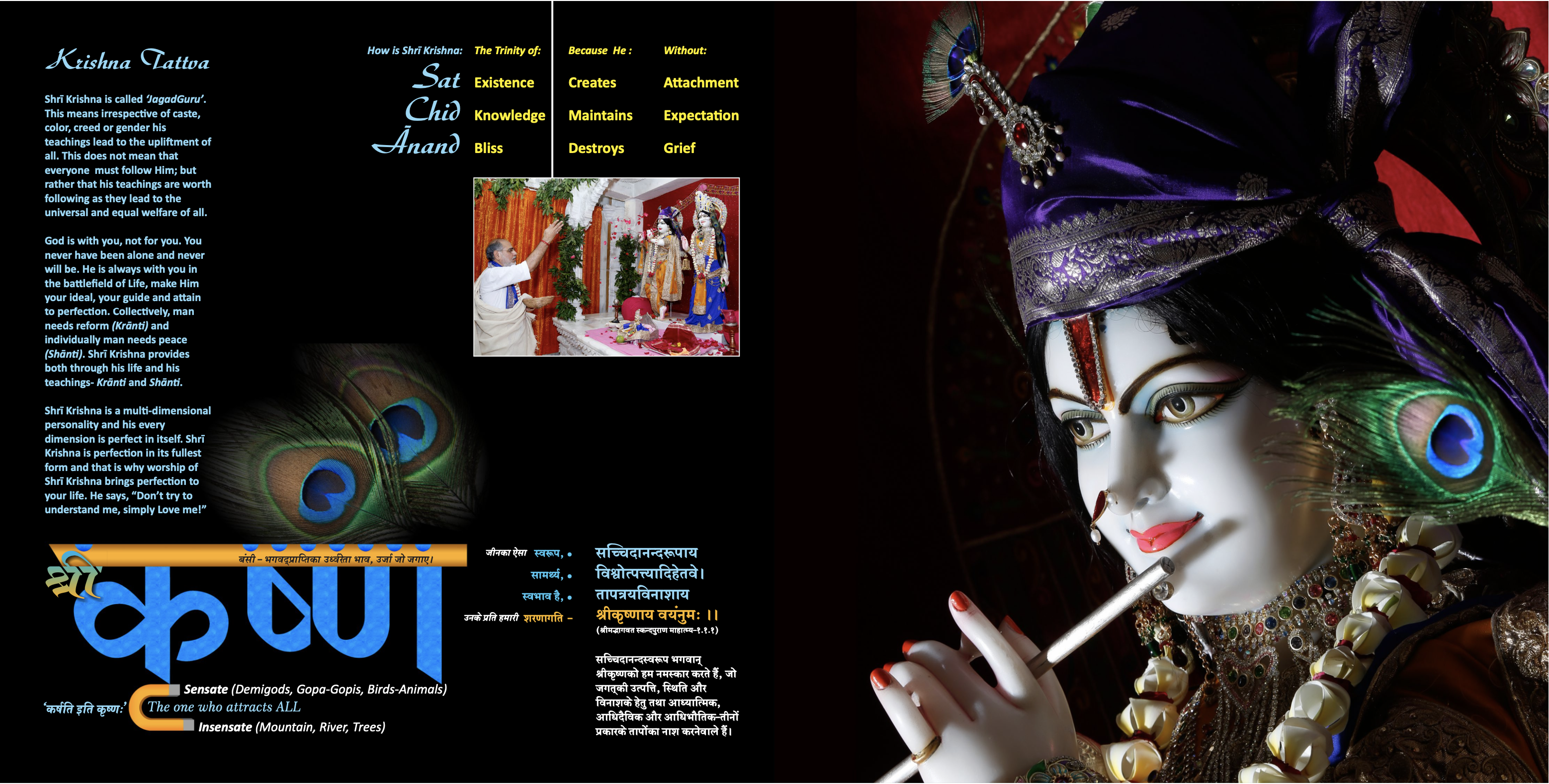
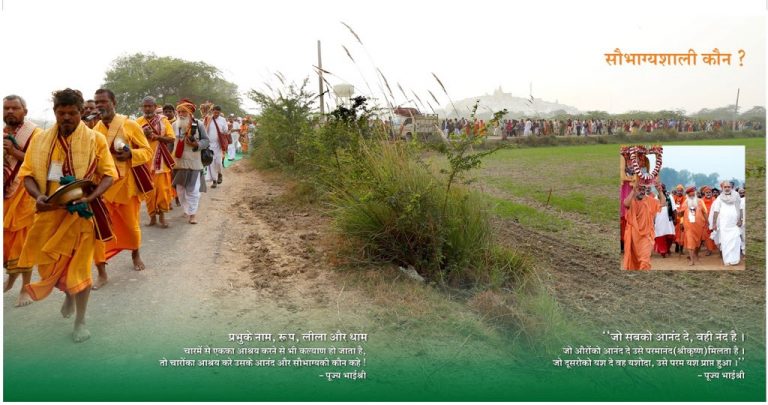
Did-You-Know?
There are different rewards given to one, depending on the quality of how one gives charity (dāna), which is dependent on a number of factors including, to whom, where, how, the time, the place etc.
Click-Here to Listen:
Share your answer or a fun-fact in the comments section below……
#ShrimadBhagavat #Mahatmya #ShlokOfTheWeek #SVN_SOW #ScriptureOfLove
Series by Rishi Harshitbhai Shukla – @HarshitbhaiShukla;
Nimishaben Sadhu (India);
Rajeshbhai Purohit (UK).
About this Article
This is a part of an ongoing series to learn a Shlok a week from the Purushottam Maas Shrimad Bhagavat Katha by Pujya Bhaishri Rameshbhai Oza.
We hope devotees are able to savour a few fun facts on these verses with an enhanced interest for the context and divine nuances through this series.
This Article is the 18th in the ‘Shlok of the Week’ Series.